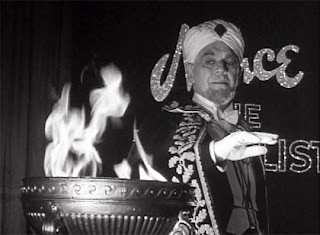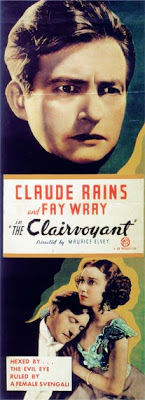Now Playing: The Clairvoyant (aka The Evil Mind; 1935)
Pros: Thoughtful examination of the lure of fame and the curse of being "different"; Strong performance by Fay Wray
Cons: Dull stretches with Jane Baxter mooning over Claude Rains; Pat, unsatisfying ending
Pros: Thoughtful examination of the lure of fame and the curse of being "different"; Strong performance by Fay Wray
Cons: Dull stretches with Jane Baxter mooning over Claude Rains; Pat, unsatisfying ending
"We are all interested in the future, for that is where you and I are going to spend the rest of our lives. And remember my friend, future events such as these will affect you in the future. You are interested in the unknown... the mysterious. The unexplainable. That is why you are here." Criswell, Plan 9 From Outer Space (1959)The Amazing Criswell aside, the future isn't what it used to be. Once upon a time in the dim, remote past called the 20th century, the future was big business. Among mystic Edgar Cayce's clients were such luminaries as Woodrow Wilson and Thomas Edison. Nostradamus was a rock star 400 years after he penned his last prophecy. Performers like the Amazing Kreskin routinely popped up on late night television to share their psychic insights. And their predictions dealt with more than just the tiresome minutiae of celebrity life -- they were about war and peace, wealth and poverty, the fortunes of great statesmen and politicians, and even the fate of the earth itself.
 |
| Not even the Amazing Criswell could have predicted the enduring popularity of Plan 9 from Outer Space |
The Clairvoyant was made a long, long time ago, far away across the pond. The fading British empire was, like the U.S., in the grip of a deep, grinding depression. Of course, people needed distractions from the everyday cares of life, and music halls were all the rage. Many of the stages were occupied by blindfolded mentalists who could still wow the rubes by sending their assistants out into the audience to procure personal items that the performers would identify with their "second sight." It was a far more innocent time than our own.
Maximus, portrayed by the amazing Claude Rains, is a garden-variety mentalist. At the beginning of the film, we see him practicing his routine with his wife and stage assistant Rene (Fay Wray).There's a lot of mental energy involved in the act, but it has nothing to do with psychic abilities. Maximus has a big job to do, memorizing all the various permutations of "Now what am I holding in my hand Maximus?" and all the personal articles they stand for ("Now what am I holding?" might mean a billfold and "Can you tell what I'm holding?" a tie-pin; Criss Angel's Mindfreak this ain't.)
At a routine performance, a party of rich, insouciant trust-funders is watching from the expensive seats. They're on to Maximus' act, and try to get Rene to come over to their box for a unique personal item they know the mentalist and his assistant haven't prepared for. Rene studiously avoids them. The commotion from the spoiled rich kids throws off Rene's and Maximus' timing, and the audience grows restless as they see Maximus struggling. One member of the rich kids' party, Christine (Jane Baxter), isn't interested in revealing the act as a fake. She seems genuinely enthralled by Maximus.
 |
| The fake mentalist has his first real psychic vision. |
Cut to a train speeding through the countryside at night. Maximus and his entourage -- wife, mother (Mary Clare) and manager Simon (Ben Field) are traveling to their next gig, and discussing what happened at the theater. Mother reveals that her father, Maximus' grandfather, had true psychic abilities. Maximus assures his worried wife that it only happened once, and may never again. Simon hopes it will show itself again-- "we could make our fortunes!" Wise to the psychic world, mother speculates that someone in the audience emanated a kind of psychic energy, like a battery, that jumpstarted Maximus' visions.
The same girl (Christine) from the theater walks past the group in the rail car. "I've seen that girl before," Maximus says as he goes into a near-trance. Suddenly his eyes widen as he recalls his vision of Christine's railway journey at the theater. He jumps up and pulls the emergency cord to stop the train, explaining to the exasperated conductor and everyone within earshot that the train is going to crash. Maximus, his entourage and a small group of excited people including Christine disembark. A little while later when they learn from a station master that the train did indeed crash, Christine immediately gets on the phone to her father, a wealthy newspaper man (Lord Southwell, played by Athole Stewart).
 |
| Moon-eyed Christine (Jane Baxter) is the "battery" that jump starts Maximus' psychic powers. |
It's not long before the downside of fame and fortune rears its ugly head. Christine is obviously the psychic battery for Maximus' gift -- he only goes into his trances in her presence. As the newspaper heiress spends more and more time with the swollen-headed psychic, the loyal and long-suffering wife is increasingly pushed to the side. As she packs up to leave, Maximus sees his mother's death before it happens.
Brought together by the tragedy, Rene tries to get her husband to see that this power fueled by Christine is bad, but like an addict, Maximus is reluctant to part with the "gift" that has made him a celebrity. Then, just when it seems things can't get any worse for the man torn by family and fame, he makes a prediction about a major tunnel disaster that will come back to haunt him…
 |
| Maximus and Rene are apprehensive as a nearby clock tower seems to toll for the end of their marriage. |
Fay Wray as Rene and Mary Clare as Maximus' mother are also exceptionally good as each in turn tries to save him from his own hubris and the unwitting psychic clutches of uber-groupie Christine. On the other hand, Jane Baxter as Christine spends most of the film staring at Maximus with moon eyes (or is she just constipated?). In spite of ol' Moon Eyes, Maximus' first encounter with the power within himself is very effective. The turnaround from a blown stage act to a genuine encounter with the unknown is sudden and jarring: Maximus pulls off his blindfold, and with Christine's eyes locked on him, he goes into a trance. His face, just a moment before in shadows, is suddenly suffused with an eerie light. When it's clear that he can somehow see the man's letter about his hospitalized wife, his simple words "you'd better go to your wife" are chilling. By comparison, Maximus' later trances are anticlimactic. (And unfortunately, Rains goes way over the top toward the end when his character is trying to convince the workmen that the tunnel they're working on is going to collapse and flood on them.)
 |
| The desperate psychic implores the workers to stay away from the tunnel. |
In spite of its disappointing wrap-it-up-with-a-pretty-bow ending, this modest old B movie leaves the viewer with a few things to think about. Who could have predicted that?
Where to find it:
The Internet Archive
Amazon Instant Video
Netflix Instant Watch
Bonus Mentalist Act: The Prediction (Episode 10, 1st season of Thriller, the Boris Karloff-hosted TV series,1960-1962)
The Clairvoyant reminded me of one of the better 1st season episodes of the old Thriller series from the early 1960s, so I watched it again, thinking it might have been based on the same source material as the movie. Both share the same premise, about a fake mentalist who suddenly acquires real psychic powers. But while The Clairvoyant was based on a novel, The Prediction seems to have been filmed from an original teleplay. It's a distinct possibility that writer Donald Sanborn saw the movie at some point and was either overtly or subconsciously influenced. The opening mentalist act scenes are very similar to one another. Boris himself plays Mace the Mentalist, decked out in a fancy cape, white gloves, and mystic turban. Like Maximus, when a member of the audience starts heckling him, demanding to know who will win the big boxing match, he falters, then suddenly seems to connect with an authentic psychic plane. "Someone will be killed in the ring!" he says, his voice rising. "The fight must be stopped!" he shouts, running toward the stage exit. In his panic, he tips over a flaming urn and nearly burns the theater down.
 |
| Remember, only you can prevent stage fires caused by freaky psychic visions. |
The latter part of the episode involves his prediction of disaster for Norine and her fiance as they head off to get married. He begs them to turn around at once if they see a twisted road sign to Edinburgh. They laugh it off, since they're headed in the opposite direction and couldn't possibly encounter such a sign. Or could they?
This is one of a handful of Thriller episodes (and the only season one episode) that Boris Karloff starred in. It's compelling, suspenseful and well-acted all around -- a showcase episode for a wonderfully eccentric and eclectic show that, like The Twilight Zone and The Outer Limits, featured top-notch acting, writing and production talent. John Brahm, of The Lodger (1944) and Hangover Square (1945) fame, directed.
Where to find it:
Amazon
"You'd better go to your wife!"



Great review, Brian! I have not heard of The clairvoyant, but I am very intrigued! Plus, Fay Wray!
ReplyDeleteThanks so much John! I think it would take a real clairvoyant to figure out why this film isn't better known, as it is highly effective and entertaining, with real star power. Fortunately there are some good copies out there on YouTube at the moment.
DeleteAh, I've got to look for this one--Fay Wray is underrated and Claude Rains is awesome, of course.
ReplyDeleteWray and Rains are superb, and there are some very effective scenes in this one!
Delete